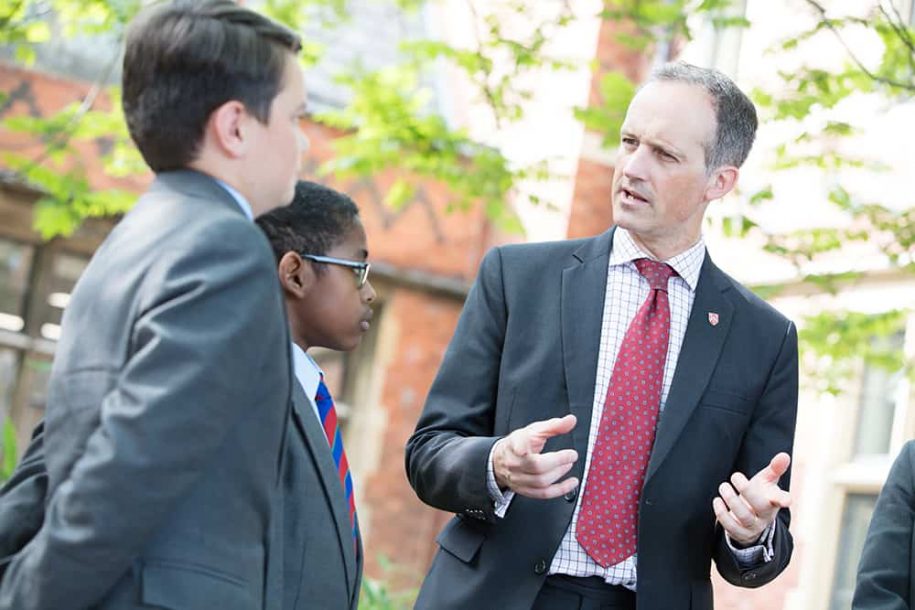We must be masters of our technology

<strong>We must be masters of our technology</strong>
<strong> </strong>Parents will have received my letter yesterday referring to our decision to alter our iPad programme. At present, the media is full of stories of the dangers posed to young people by social media, screen addiction and the like. Just a couple of days ago, I read that the World Health Organisation has classified gaming addiction as a ‘mental health condition’, and the Culture and Digital Secretary, in a speech on Wednesday, <a href=”https://www.thetimes.co.uk/edition/news/digital-secretary-matt-hancock-calls-on-schools-to-ban-mobile-phones-nq5jdz5j2″>called on schools to ban mobile phones</a>, precisely because of the distraction they cause. Certainly, I have received a great deal of correspondence from parents during the last two years about their mixed feelings towards boys’ mobile devices, whether the iPads are provided by the school, or the Smartphones originally given by parents to their children out of concern for their safety.
I am sure that some parents will see this as an over-reaction of adults who are, in some way, ‘out of touch’, that the ‘genie is out of the bottle’ with young people’s dependence on being permanently connected, and that there’s no point in Loughborough Grammar School trying to put it back. There is, however, an increasing body of opinion that backs these decisions. Boys (and men!) are particularly vulnerable to any form of addictive behaviour, whether it’s a computer screen, alcohol, drugs or gambling, and very many of us will have had conversations with our sons when a simple request to put down a device develops into a full-blown argument. Electronic devices are addictive and therefore can easily distract us from what really should have our full attention.
Even as adults, we seem to have a love-hate relationship with technology. Although I resisted owning a mobile phone for many years after they became prevalent, it’s impossible for me to now imagine a life without my Smartphone. How would I check my emails? How would I know what time the restaurant closed? If truth be told, I am a little bit addicted, and I know I’m not alone. In surveys of teenagers, the obsessive Smartphone use of their parents is often cited as the one thing they wish could change in their family life.
This time last year, I devoted my blog to the subject of Digital Parenting and we distributed some guidance to all parents. An electronic copy of the guide is available <a href=”https://www.lesgrammar.org/about/digital-parenting/”>on the school website</a>. At the Grammar School, we have come to the conclusion that we need to work with you if we are to provide the best possible environment for boys to be able to focus on their academic work whilst developing an understanding of when technology is their friend, and when it is a distraction. This is particularly important because our children are inevitably ahead of us when it comes to new games, new social media platforms and new websites. I think it’s ironic that we are so much stricter with our children about their security outside the house; we don’t allow them as much freedom to roam as we probably had as children. However, parents of very young children are often happy to give virtually unfettered access to the internet. I’m not sure if we’re oblivious to the dangers, but we tend to feel that it won’t be our child who is groomed, prematurely sexualised or traumatised by unpleasant video content.
We need to control pupils’ use of technology until they can self-regulate more effectively. We don’t just let teenagers get behind the wheel of a car. We insist that they study and pass a theory test, and that they have a series of lessons to prove their competence. We therefore must methodically introduce children to the positives of technology but provide limits – notably time limits. One of my suggestions in my Digital Parenting blog of 30<sup>th</sup> June 2017 was to develop a contract of understanding between children and parents (please see the link above), and I was delighted to receive an email some months later from a parent who described the difficult process of negotiating reasonable limits with her son. However, after the initial withdrawal symptoms and conflict, her relationship with her son had returned to its pre-technology phase and she concluded with the gratifying line “thank you for giving me my son back”.
There are so many toxic issues that young people are suffering from as a result of their open access to technology and the internet. We know that there is an unprecedented mental health crisis among young people. Social media is often blamed, notably for providing a platform where bullying can fester – particularly when, via Snapchat, a message disappears leaving no evidence trail. Something that causes certain young people a huge amount of stress is FOMO – Fear of Missing Out. Children’s sleep is being curtailed as the desire to wake in the middle of the night to check the latest social media posts is irresistible. Do you insist that your son charges his device(s) outside his bedroom each night? You should! And I hardly need to mention the flavour of the month, Fortnite, which certainly has a massive following in Years 8 and 9.
At the Grammar School, we are very worried about boys’ unchecked use of technology, hence the new rules we will introduce in September, and the decision to return iPads into teachers’ hands. We are looking forward to seeing fewer boys stuck behind a screen at lunchtime. Evidence tells us that human (face-to-face) interaction and physical exercise are some of the best ways to stave off depression and loneliness. We have an amazing range of lunchtime clubs and activities, and our younger boys need to be in the different departments engaging with their peers, or else playing outside. We see no justification for them playing on their devices in their free time at school.
